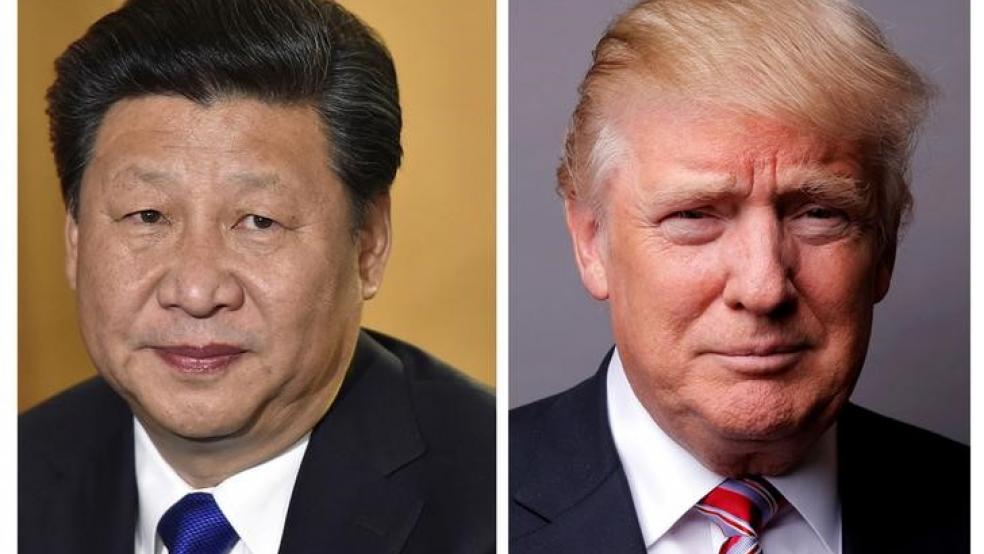Less than a week before he sits down with the president of China for what will be his most complex and challenging foreign negotiation since taking office, President Trump gave an interview to The Financial Times in which he seemed to suggest that solving crisis over North Korea’s missile tests and renegotiating the trade relationship between Washington and Beijing would not be that tough after all.
The president has placed much of the responsibility for dealing with the Chinese government in the hands of his son-in-law, Jared Kushner, the former head his family’s real estate business who has no relevant foreign policy experience. At the same time, the State Department, populated with experts who have long histories of dealing with China, appears to be playing less of a role than it might have in previous administrations.
Related: The Trump Administration Thinks We’re Already in a Trade War
Still, faced with questioning about how he will handle the sit-down with Chinese President Xi Jinping on Thursday at Trump’s private Mar-a-Lago Club in Florida, the president expressed nothing but confidence.
Asked about how he would address the North Korean crisis in his talks with Xi, Trump said that while he would like Beijing’s help in dealing with Pyongyang, he doesn’t actually need it.
“China will either decide to help us with North Korea, or they won’t. And if they do that will be very good for China, and if they don’t it won’t be good for anyone,” he said.
Pressed for details, he said, “Well, if China is not going to solve North Korea, we will. That is all I am telling you,” Trump said. Asked to clarify that he was saying he could solve the problem without assistance from China, one of North Korea’s few global allies, he confirmed, “Totally...I don’t have to say anymore. Totally.”
Related: Trump’s Protests Over Russia Investigation Hit a Crescendo
The president appeared equally assured of himself on the question of trade. He spent much of his presidential campaign attacking China for what he describes as unfair trade practices and vowing to slap punitive tariffs on goods coming to the US from China unless Beijing offered major concessions. He also promised to officially declare China a “currency manipulator” on his first day as president -- a promise he failed to keep.
Trump is fixated on the fact that there is a trade deficit between the US and China -- something he sees as unfair on its face, even though trade economists insist that the mere existence of a trade deficit between any two given countries is not by itself important.
Asked how he would bring down the deficit, Trump said it would be as simple as telling the Chinese president that it needs to happen.
He would do it, he said, “By telling China that we cannot continue to trade if we are going to have an unfair deal like we have right now. This is an unfair deal.”
Related: China Finds a New Source of Cutting-Edge Military Technology: US Startups
However, he balked at discussing tariffs, offering a brief soliloquy on how badly other presidents had misunderstood the mechanics of global trade and how he has the knowledge to solve the problem.
“I don’t want to talk about tariffs yet, perhaps the next time we meet,” he said. “So I don’t want to talk about tariffs yet. But you used the word equalize. That is a very good word because they are not equalized. If you used a word other than tariff, it is not an equal. You know when you talk about, when you talk about currency manipulation, when you talk about devaluations, they are world champions. And our country hasn’t had a clue, they haven’t had a clue. The past administration hasn’t had and many administrations — I don’t want to say only Obama; this has gone on for many years — they haven’t had a clue. But I do.”
The thing to watch when Xi arrives at Mar-a-Lago later this week will be which of Trump’s advisers seem most closely engaged with the Chinese president and his entourage. During the campaign, much of Trump’s tough talk on China seemed to emanate from a cadre of hardliners in his inner circle, including White House Chief Strategist Steve Bannon, National Trade Council Director Peter Navarro, and Commerce Secretary Wilbur Ross. All three are advocates of a much more confrontational policy on trade issues.
The other element of the Trump team is embodied by Kushner and, to some extent, Secretary of State Rex Tillerson. Until recently, Kushner’s family was in negotiations with a government-connected Chinese insurance company to make a massive investment in an office tower they own in Manhattan, and Kushner himself has been the object of a charm offensive by senior Chinese officials visiting Washington.
Related: What Is THAAD? A $1.6 Billion US Weapon That’s Going to Korea – and Worrying China
For his part, Tillerson is the highest-ranking member of the administration to have met Xi so far, and he came out of a meeting with the Chinese president mouthing phrases, like “mutual respect,” that Beijing often uses to draw lines around areas they see as non-negotiable.
The faction within the Trump team that takes the lead in this week’s talks will tell observers a lot about the direction of the US-China relationship.





